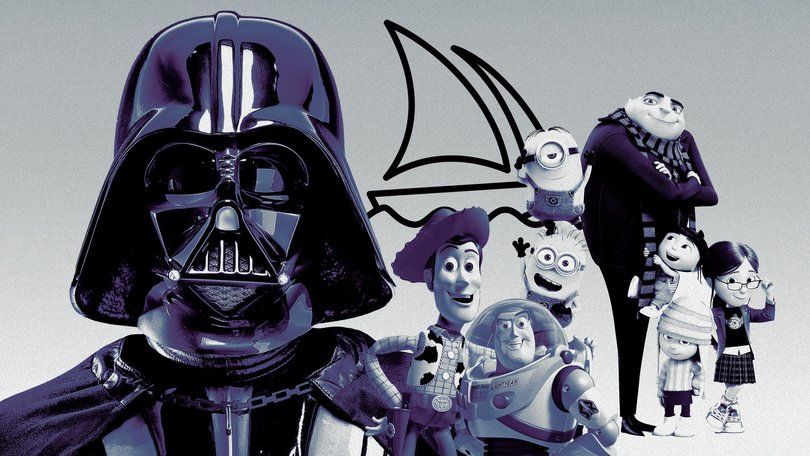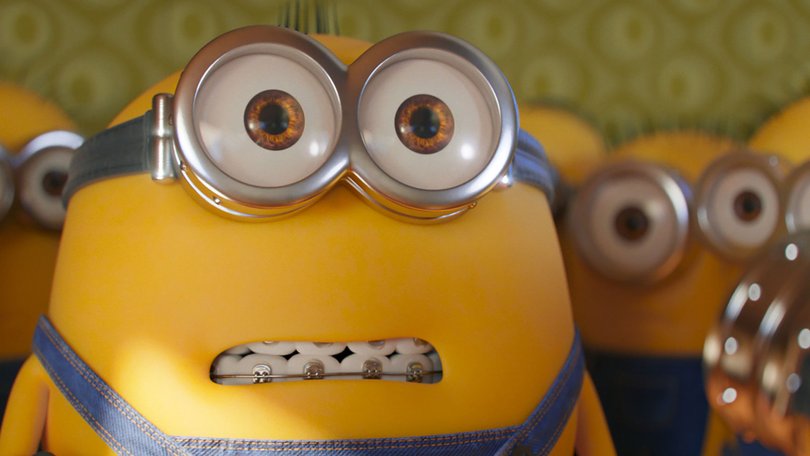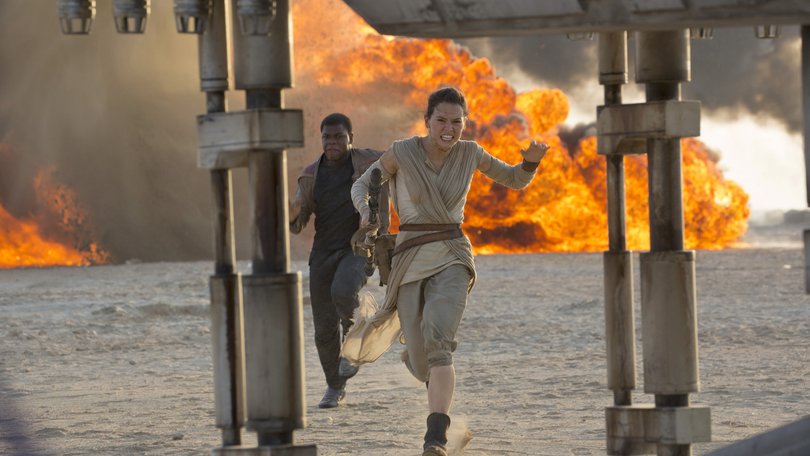WASHINGTON POST: Disney, Universal lawsuit could shift future of industry as movie empires strike back at AI
The Washington Post: Disney and Universal use the force of copyright law on ‘bottomless pit of plagiarism’ of Artificial Intelligence models using their intellectual property.

The battle over the future of AI-generated content escalated on Wednesday as two Hollywood titans sued a fast-growing AI start-up for copyright infringement.
Disney and Universal, whose entertainment empires include Pixar, Star Wars, Marvel and Despicable Me, sued Midjourney, claiming it wrongfully trained its image-generating AI models on the studios’ intellectual property.
They are the first major Hollywood studios to file copyright infringement lawsuits, marking a pivotal moment in the ongoing fight by artists, newspapers and content makers to stop AI firms from using their work as training data - or at least make them pay for it.
Sign up to The Nightly's newsletters.
Get the first look at the digital newspaper, curated daily stories and breaking headlines delivered to your inbox.
By continuing you agree to our Terms and Privacy Policy.As AI rapidly develops, tech companies have raced to build and monetise tools that generate Hollywood-grade images and videos.
Now these tools are poised to transform movie-making and the entertainment industry in coming years, experts say, and this lawsuit represents a bid by some of Hollywood’s giants to secure their place in that future.

“It’s sort of a ‘finally’ moment,” said Chad Hummel, principal at the Los Angeles office of the law firm McKool Smith. Previously, entertainment giants had stayed on the sidelines even as researchers documented how AI tools could be used to generate apparently infringing content. Now they’ve entered the fray in a big way.
Midjourney is one of a handful of AI generators that has captured the world’s imagination by letting users spin up images on demand. What started as a novelty quickly became a major source of online content, as people used Midjourney and other generators such as OpenAI’s Sora and Stable Diffusion to generate everything from memes to pornography to re-imaginations of popular characters from movies and TV.
But the resulting images don’t come from a vacuum — the AI models are trained by ingesting millions of words and images from across the internet, including copyrighted work from individual artists and entertainment studios.
AI companies claim that their generators are spitting out entirely new creations and that the training data falls under “fair use” according to copyright law. Artists and midsize media companies have pushed back, saying the AI is stealing their work.
Disney and Universal’s lawsuit frames the issue as a matter of good versus evil, calling Midjourney “a bottomless pit of plagiarism”. AI industry advocates counter that legacy media companies are standing in the way of a technological advance that could unleash a wave of creativity.
Midjourney did not respond to a request for comment Wednesday.
In the suit, filed in US District Court for the Central District of California, the companies allege that Midjourney “seeks to reap the rewards” of Disney’s creative work by selling an AI image service that “functions as a virtual vending machine, generating unauthorised copies of Disney’s and Universal’s copyrighted works.”
Indeed, AI-generated content depicting beloved — and copyrighted — characters such as Mario, Shrek or Winnie the Pooh has circulated online, at times going viral on social media and spawning a new approach to fan art.
Star Wars junkies, for instance, no longer have to comb the web for stories and visuals based on their favourite characters — they can use an AI video generator to create an original 11-minute Star Wars movie with photorealistic sets and characters.
AI video still isn’t advanced enough to produce passable full-length films or TV shows, Washington Post tests found.
That might be why copyright holders waited to file lawsuits against AI video generators, said James Grimmelmann, a law professor at Cornell University.

While AI audio can now produce songs that sound human-generated, AI video hasn’t made that leap, he said. OpenAI’s Sora, for example, can only generate content roughly a minute long.
And although the speed and fluency is a remarkable improvement compared to older models, it doesn’t offer the kind of fine-grained controls directors and studios need, according to Grimmelmann.
But production companies are already using AI for preproduction brainstorming, special effects and on-screen images. The quality of AI-generated content has improved rapidly since OpenAI first released its image generator DALL-E in 2021, with companies including OpenAI and Google now offering video generators to the public.
Many believe it’s a matter of time before content that’s entirely AI generated makes its way into mainstream entertainment. SAG-AFTRA, the union representing film and TV actors, has struck deals with voice AI companies allowing actors to license their voices, and this week the union reached a tentative agreement with a collection of video game companies to pay actors if their voices or likenesses appear in AI-generated games.
“Patience and persistence has resulted in a deal that puts in place the necessary A.I. guardrails that defend performers’ livelihoods in the A.I. age,” the union said in a blog post Monday.
Meanwhile, a new class of AI start-ups such as Moonvalley and Runway are already working with Hollywood studios to integrate AI into the production process, the companies have said.
This lawsuit is the latest in a barrage by rightsholders — including artists, authors and media companies — alleging infringement by AI firms. Among the highest-profile cases is one filed by the New York Times against OpenAI, the maker of ChatGPT.
At the same time, many are signing multimillion-dollar licensing deals with AI firms granting them full access to their content — for a price. (The Washington Post has a content-sharing deal with OpenAI.)
The Disney and Universal suit takes a different tack from other lawsuits, demanding that Midjourney filter what it generates rather than avoid scraping the studios’ intellectual property altogether.
“This one seems more aimed at establishing the kind of expectations that copyright owners have of non-AI platforms: You need to take down obvious copies of our works,” said Grimmelmann.
What the movie studios don’t want, according to Hummel, is for tech firms to be able to cut them out of the equation by training models on their work without having to pay for it.
“This is not going to be Hollywood trying to shut down generative AI,” Hummel said. “It’s about compensation.”
Already, many visual artists are feeling the effects of AI’s entry, said Jon Lam, a video game artist and creators rights activist. He said he has watched his circle of professional contacts struggle to find work when AI can replicate different art styles with the click of a mouse.
Wednesday’s lawsuit was “a huge confidence boost” for creatives like Lam hoping for an upset that stops film, TV and video game studios from drawing on artists’ work without paying them, he said.

A win for Disney and Universal wouldn’t necessarily protect artists in the entertainment industry from getting replaced by AI, said Ben Zhao, a professor of computer science at University of Chicago who helped build Glaze, a software tool that protects visual art from AI mimicry.
But it could drastically limit the material that AI tools can draw from, he said.
Without fresh data, AI generators would regurgitate the same visual ideas over and over, Zhao said, making them less useful for production companies. In that sense, both AI companies and entertainment studios rely on artists who produce new work and make a living wage.
Some tech industry leaders have argued that creating tools such as ChatGPT would be impossible if they couldn’t be trained on copyrighted data — and that requiring AI companies to pay every creator would stall an AI boom that promises vast economic benefits.
Studios such as Disney and Universal should embrace AI video rather than suing to stop it, said Adam Eisgrau, who leads a program on AI, creativity and copyright for the Chamber of Progress, a center-left trade group that represents technology companies including Midjourney.
“My initial reaction is that the movie industry has a long history and a short memory,” Eisgrau said. He compared the lawsuit to one decades ago in which studios sued the makers of videocassette players and lost —which he said was “lucky for them,” because they ended up profiting greatly from the technology.
Meanwhile, each step forward for AI video is met with rapt attention from fans of the tech. A clip posted Sunday in the Reddit forum r/aivideo showed a short trailer for a nonexistent movie — one with visual references starkly similar to science fiction series such as Star Wars.
“Please turn this into a feature film. It would be freaking crazy,” one commenter said.
“That’s the plan!” replied the poster.
Originally published as How Disney’s AI lawsuit could shift the future of entertainment
